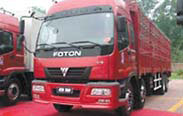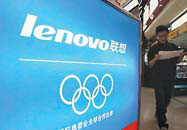

Truck venture

Major Chinese truck maker Beiqi Foton and Daimler AG have agreed to set up a 50-50 truck venture with total investment of 6.35 billion yuan, and securing the German company a foothold in China's truck market.
Beijing Foton Daimler Automotive Co will start producing diesel engines in 2011 and trucks in 2012, with annual heavy-duty truck sales projected at 100,000 units from 2012 to 2015, the Chinese firm said last Wednesday.
Unlike most foreign auto ventures in the country, which mostly target the Chinese market, the world's second-largest, Beijing Foton Daimler aims eventually to become a global player.
The partners have agreed to set up joint ventures in Russia, south Asia and Latin America after the planned engine and truck project takes off, the statement said.
Huawei sales surge
Chinese telecom equipment maker Huawei Technologies said its contract sales increased 46 percent year-on-year in 2008.
Sun Yafang, chairwoman of Huawei Technologies, said in an email to employees dated Jan 2 that the company's contract sales amounted to $23.3 billion in 2008, with 75 percent coming from overseas markets.
"Last year, we maintained a solid and healthy growth," Sun said in the email. She said Huawei's contract sales are expected to increase 28.8 percent to $30 billion in 2009.
The worldwide economic slowdown has prompted many telecom operators to trim spending growth, resulting in a fall in demand of new equipment from suppliers, including Ericsson and Nokia Siemens Networks.
Ssangyong support
Shanghai Automotive Industry Corp (SAIC), China's largest carmaker, has agreed to allocate 25.9 billion won ($19.69 million) to the troubled Ssangyong Motor, SAIC said last Monday.
The financing is "part of the payment of an established new product development project," SAIC said in an email statement.
SAIC, which acquired a 51.33 percent stake in the ailing South Korean auto maker in 2004, hoped "the project could help Ssangyong to soothe the pressure from tight cash flow in short term", the statement said.
However, the fund is not enough to save Ssangyong from the net loss of more than 100 billion won in 2008 it reported on Dec 23 due to a slump in demand.
South Korea's Maeil Business Newspaper quoted a Ssangyong official as saying Ssangyong employees were expecting the capital to be used for their delayed salaries, totaling 29 billion won for 8,000 staff.
New China Life up
New China Life Insurance, one of the country's largest life insurers, saw its core business grow by 166 percent year-on-year in 2008.
The company's APE (annualized premium equivalent), a key indicator for the new business, is up 90 percent on a yearly basis, despite the sluggish stock market and sliding economy.
The good performance is largely attributed to New China Life's strategy of sticking to developing protection-oriented products, said Sun Yuchun, spokesman of the company.
In 2007, many insurance companies strived to develop unit-linked insurance policy, a type largely linked with the capital market, due to China's bullish stock market. But New China Life only launched a unit-linked insurance policy on a pilot basis at the end of 2007, which aimed to improve its product line, said Sun.
Lenovo cuts jobs

Lenovo, the world's fourth largest personal computer maker, is preparing to cut 2,500 jobs, about 11 percent of its global workforce, according to an announcement posted at Hong Kong Exchange's website last Thursday.
The company will also cut $300 million of spending in the fiscal year ending on March 31, 2010, the announcement said. The company was forced to restructure by its weak performance and "potentially huge losses" in the fourth quarter of 2008, according to the statement. Under the restructuring plan, Lenovo will merge its Asia Pacific operations with its Greater China and Russia operations, and its Toronto-based customer service center with Morrisville center in North Carolina in the United States.
Textile profits down
Chinese textile firms' profits declined for the first time in ten years as a result of reduced overseas demands. The decline started during the second half of 2008 when the financial crisis began impacting the world economy.
Textile firms took in 104.2 billion yuan in profits in the first 11 months of last year, a fall of 1.77 percent over the same period in 2007, according to the National Bureau of Statistics (NBS).
"This was the first decline in profits for the country's textile sector in 10 years," said Wang Qianjin, chief editor of the country's leading textile website webtextiles.com.
The NBS also said losses for textile firms added up to 22.75 billion yuan from January to November last year. That is almost double the figure for the same period in 2007.
Solar cell stake sold
Shanghai Electric Group Co, China's largest maker of power equipment, has sold its stake in Shanghai Topsolar Green Energy Co and exited the solar energy business to focus on its core businesses like wind power.
Shanghai Electric sold the 36 percent stake in solar cell maker Topsolar to Yancheng Dongtou New Energy Equipment Co for 138.6 million yuan, it said in a statement to the Shanghai Stock Exchange.
The company said it decided to move away from the solar energy business as it had limited synergy with its other businesses.
Shanghai Electric also plans to sell its balance 25.35 percent stake in Topsolar soon, the statement said.
Established in 2002, Topsolar's major products include varieties of photovoltaic modules and photovoltaic power generation system.
Indian nuke contracts
China's State Nuclear Power Technology Corp has won contracts to design power plants in India, as it expands overseas in the face of slowing orders in the domestic power market.
The firm's Shandong unit and a power construction company in the eastern province will help design two 1,980-megawatt coal-fired power plants in India, a State-owned Assets Supervision and Administration Commission statement said.
State Nuclear is actively expanding overseas as construction of new coal-fired power projects has "substantially dropped' in domestic market, the statement said.
China's power demand is weakening due to a slowdown in manufacturing and industrial activities amid an economic downturn and industry officials have said there may be a surplus of electricity next year.
Yulon, Geely deal
Yulon Motor Co, Taiwan's largest automaker by market value, plans to team up with mainland-based Geely Automobile Holdings Ltd to build budget cars priced below NT$350,000 ($10,600), hoping to boost sales, local media reported last week.
Yulon Motor is mulling over the idea of importing auto parts from Geely, which specializes in producing small budget cars, to be assembled at Yulon's Sanyi plant in Miaoli, Taiwan's Economic Daily News reported last Monday.
The locally assembled cars would be sold under Yulon's brand through non-conventional channels, such as used car dealers, in a bid to differentiate from its existing distributional channels and cut distribution costs, the report said.
(China Daily 01/12/2009 page7)













